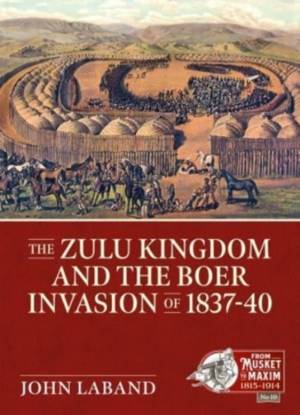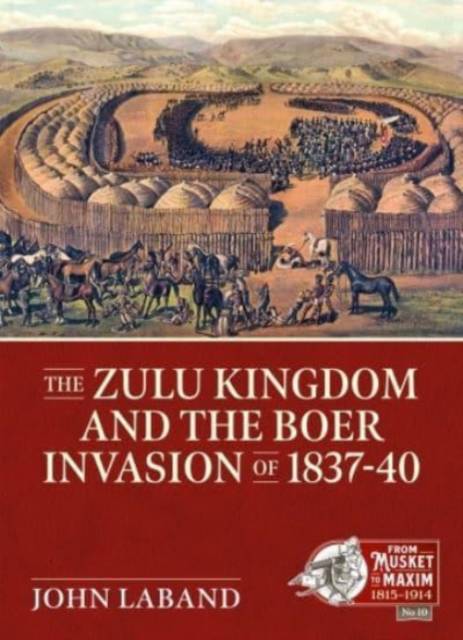
- Afhalen na 1 uur in een winkel met voorraad
- Gratis thuislevering in België vanaf € 30
- Ruim aanbod met 7 miljoen producten
- Afhalen na 1 uur in een winkel met voorraad
- Gratis thuislevering in België vanaf € 30
- Ruim aanbod met 7 miljoen producten
Zoeken
Omschrijving
The invasion in 1837 of the Zulu kingdom by Boers migrating from the British Cape Colony, and the massacres, battles and civil war that ensued between 1838-1840 as the Zulu resisted the settlers with spear against musket, was a critical moment in South African history. Many Afrikaners long celebrated their partial victory as the God-given justification for their subsequent dominion over Africans, while today Africans commemorate the war for its significance in their struggle against colonialism.
Changing perceptions in a post-colonial world require the reassessment of wars of colonial aggression, but there is no book in English that engages with the war between the Boers and Zulu in its entire context or takes the Zulu evidence into proper account. This work attempts to do so. While dealing with the warring sides as even-handedly as possible and contrasting their military systems, it also makes a point of developing the less familiar Zulu perspective, explaining political motivation, strategic military objectives and fissures in the royal house. Further, the book situates the Great Trek of the Boers, or Voortrekkers, in the context of the many migrations taking place at that time in southern Africa as the result of widespread political and social upheavals, of which the militarily powerful Zulu kingdom had been the most significant outcome.
The book begins with the journey of the Voortrekkers over the highveld form the Cape Colony towards Zululand where they intended to settle, and with the war they fought and won in 1836-1837 against the Ndebele, an offshoot of the Zulu whose military system they shared. The battle of Vegkop proved the superiority of musket-fire directed from a secure wagon laager against an enemy armed primarily with spears, and would be the model for successful Boer engagement against the Zulu in 1838 at the battles of Veglaer and Blood River. The campaign of 1838 also demonstrated that the Zulu was masters of surprise, ambush and manoeuvre in the open field that resulted in their victories at the battles of Bloukrans, eThaleni, the Thukela and the White Mfolozi.
The war reached a stalemate by the end of 1838 but Dingane, the Zulu king, had been discredited by his inability to expel the Boers from the southern part of his kingdom. His half-brother Mpande then rebelled against him and, in alliance with the Boers, overthrew him in 1840. The Boers recognized Mpande as king over a reduced Zulu kingdom that maintained its independence until the British invasion of 1879.
Changing perceptions in a post-colonial world require the reassessment of wars of colonial aggression, but there is no book in English that engages with the war between the Boers and Zulu in its entire context or takes the Zulu evidence into proper account. This work attempts to do so. While dealing with the warring sides as even-handedly as possible and contrasting their military systems, it also makes a point of developing the less familiar Zulu perspective, explaining political motivation, strategic military objectives and fissures in the royal house. Further, the book situates the Great Trek of the Boers, or Voortrekkers, in the context of the many migrations taking place at that time in southern Africa as the result of widespread political and social upheavals, of which the militarily powerful Zulu kingdom had been the most significant outcome.
The book begins with the journey of the Voortrekkers over the highveld form the Cape Colony towards Zululand where they intended to settle, and with the war they fought and won in 1836-1837 against the Ndebele, an offshoot of the Zulu whose military system they shared. The battle of Vegkop proved the superiority of musket-fire directed from a secure wagon laager against an enemy armed primarily with spears, and would be the model for successful Boer engagement against the Zulu in 1838 at the battles of Veglaer and Blood River. The campaign of 1838 also demonstrated that the Zulu was masters of surprise, ambush and manoeuvre in the open field that resulted in their victories at the battles of Bloukrans, eThaleni, the Thukela and the White Mfolozi.
The war reached a stalemate by the end of 1838 but Dingane, the Zulu king, had been discredited by his inability to expel the Boers from the southern part of his kingdom. His half-brother Mpande then rebelled against him and, in alliance with the Boers, overthrew him in 1840. The Boers recognized Mpande as king over a reduced Zulu kingdom that maintained its independence until the British invasion of 1879.
Specificaties
Betrokkenen
- Auteur(s):
- Uitgeverij:
Inhoud
- Aantal bladzijden:
- 276
- Taal:
- Engels
- Reeks:
Eigenschappen
- Productcode (EAN):
- 9781914059896
- Verschijningsdatum:
- 8/03/2022
- Uitvoering:
- Paperback
- Formaat:
- Trade paperback (VS)
- Afmetingen:
- 170 mm x 241 mm
- Gewicht:
- 739 g

Alleen bij Standaard Boekhandel
+ 83 punten op je klantenkaart van Standaard Boekhandel
Beoordelingen
We publiceren alleen reviews die voldoen aan de voorwaarden voor reviews. Bekijk onze voorwaarden voor reviews.








